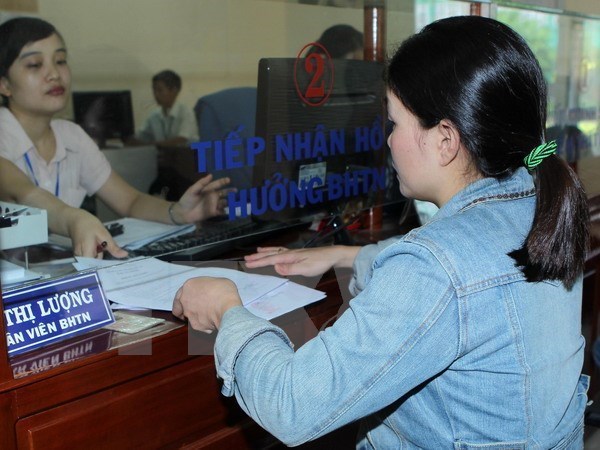Almost 25 million jobs could be lost worldwide due to COVID-19: ILO
 Job seekers are being interviewed by recruiters (Photo: VietnamPlus)
Job seekers are being interviewed by recruiters (Photo: VietnamPlus)
Hanoi (VNA) – The economic and labour crisis caused by the COVID-19 pandemic could increase global unemployment by almost 25 million, according to a new assessment by the International Labour Organization (ILO).
However, if the world see an internationally coordinated policy response, as happened in the global financial crisis in 2008 – 2009, then the impact on global unemployment could be significantly lower.
The preliminary assessment note – “COVID-19 and the world of work: Impacts and responses” – calls for urgent, large-scale and coordinated measures across three pillars: protecting workers in the workplace, stimulating the economy and employment, and supporting jobs and incomes.
These measures include extending social protection, supporting employment retention (i.e. short-time work, paid leave and other subsidies), and financial and tax relief, including for micro, small and medium-sized enterprises. In addition, the note proposes fiscal and monetary policy measures, and lending and financial support for specific economic sectors.
Rising global unemployment and working poverty
Based on different scenarios for the impact of COVID-19 on global GDP growth, the ILO estimates a rise in global unemployment of between 5.3 million (“low” scenario) and 24.7 million (“high” scenario) from a base level of 188 million last year. By comparison, the 2008 – 2009 global financial crisis increased global unemployment by 22 million.
Underemployment is also expected to increase on a large scale, as the economic consequences of the virus outbreak translate into reductions in working hours and wages. Self-employment in developing countries, which often serves to cushion the impact of changes, may not do so this time because of restrictions on the movement of people and goods.
Falls in employment also mean large income losses for workers. The study estimates these as being between 860 billion USD and 3.4 trillion USD by the end of 2020. This will translate into falls in consumption of goods and services, in turn affecting the prospects for businesses and economies.
Working poverty is expected to increase significantly too, as “the strain on incomes resulting from the decline in economic activity will devastate workers close to or below the poverty line”. The ILO estimates that between 8.8 and 35 million additional people will be in working poverty worldwide, compared to the original estimate for 2020, which projected a decline of 14 million worldwide.
Swift and coordinated policy responses
“This is no longer only a global health crisis, it is also a major labour market and economic crisis that is having a huge impact on people,” said ILO Director-General Guy Ryder. “In 2008, the world presented a united front to address the consequences of the global financial crisis, and the worst was averted. We need that kind of leadership and resolve now."
 A worker files an unemployment insurance claim. (Photo: VietnamPlus)
A worker files an unemployment insurance claim. (Photo: VietnamPlus)The ILO note warns that certain groups will be disproportionately affected by the job crisis, which could increase inequality. These include people in less protected and low-paid jobs, particularly youths, older workers, women and migrants. Migrants are vulnerable due to the lack of social protection and rights, and women tend to be over-represented in low-paid jobs and affected sectors.
“In times of crisis like the current one, we have two key tools that can help mitigate the damage and restore public confidence,” Ryder said.
“Firstly, social dialogue, engaging with workers and employers and their representatives, is vital for building public trust and support for the measures that we need to overcome this crisis.”
“Secondly, international labour standards provide a tried-and-trusted foundation for policy responses that focus on a recovery that is sustainable and equitable. Everything needs to be done to minimise the damage to people at this difficult time,” he concluded.
Vietnam has been doing a good job in containing the spread of COVID-19, said ILO Vietnam Director Chang-Hee Lee.
The country’s determination to combat the pandemic has been very clear since Prime Minister Nguyen Xuan Phuc reiterated that the government will accept economic losses to protect people’s lives and health, he said.
The pandemic might be far from over and this is the right time to start making moves to buffer negative impacts on businesses, employment and income of the majority of labourers, including those in the informal sector, Lee noted.
The ILO in Vietnam stands ready to support the Vietnamese government, employers and employees in the fight for decent work at the time of the global health, labour and economic crisis, he affirmed./.













